Charity Issue: Like a C.H.A.M.P.
C.H.A.M.P. stands for the Coalition for Headache And Migraine Patients.
Everyone has had a headache before. They suck. But for most of us, they’re minor and tend to go away quickly. But for people with frequent headaches and migraine conditions, simple head pain can make life extremely difficult, according to CHAMP, the Coalition for Headache And Migraine Patients. Patients not only experience episodic or chronic head pain, but their neurological disorder could run even deeper.
“A migraine is not just a headache, and a headache is not just a headache,” Izzy King, program manager at CHAMP, said. That’s the phrase King said is overused in the world of headache and migraine diseases. CHAMP is a group of many different nonprofits that all work towards specific goals in bettering the lives of people with chronic headache and migraine conditions. “There’s a lot of different headache diseases.”
“We’re trying to improve the lives of people with headache and migraine diseases,” King said. “Some of the [organizations in CHAMP] are trying to change legislation, some are trying to improve treatment access [and] some are trying to spread awareness.”
The general public tends to refer to an especially strong headache as a “migraine,” but that’s not medically correct. The main idea is that headache and migraine conditions are complicated and are neurological disorders that have complex treatments. They are not to be underestimated. One feature that separates headaches and migraines is that migraines, unlike headaches, tend to have many different symptoms attached to head pain, including nausea, sensitivity to sounds, smells or light and earaches that have been recorded by Julie Tadros, KHS School Nurse.
“Migraine headaches are very common and underdiagnosed,” Tadros said. “There’s a stigma attached to it. They truly have an illness that’s making them feel rotten.”
Part of the stigma comes from migraines being a more common medical condition among female patients. There tends to be less research about migraine and not enough headache specialists in the nation, according to King. While migraines do disproportionately affect women, men can still get them. In fact, King’s own father was diagnosed with a migraine disease.
“Migraine has often been called a women’s disease, and that’s not true,” King said. “There’s this myth that men can’t get migraines. It’s both not researched enough because more women get it, and it’s ignored when men get it.”
Tadros said that students with frequent headaches should consider talking to their guidance counselor about creating a 504 plan, a legal document that will aid them in securing help for their headaches while taking tests.
“Talking to your doctor is really important,” Tadros said. “If you don’t have migraines, you might think ‘well take an Advil and get on with your day.’ But it’s much more than that, and it really can be debilitating.”
Your donation will support the student journalists of Kirkwood High School. Your contribution will allow us to purchase equipment and cover our annual website hosting costs.

He/Him
Hobbies and Interests: I enjoy reading, watching the UCL after school, listening to music at 2 am, consuming TikTok slideshows, and watching...

He/Him
Hobbies and Interests: drawing, movies, drama, games
Favorite movie: Groundhog Day
Favorite Quote: “Doing nothing often leads to...










